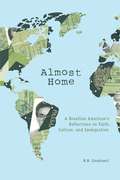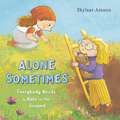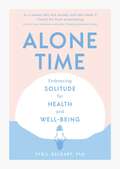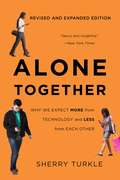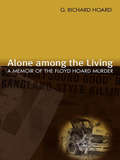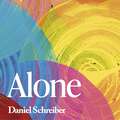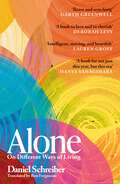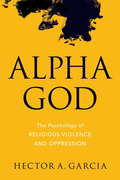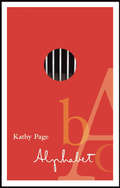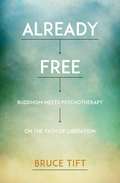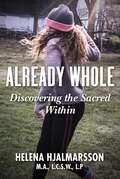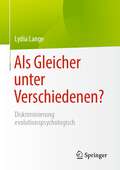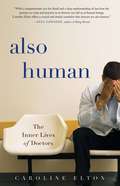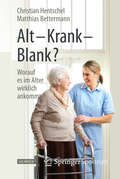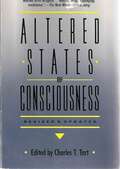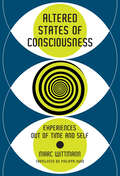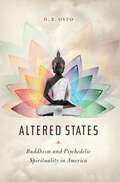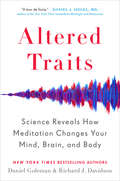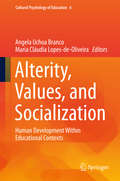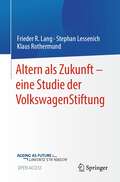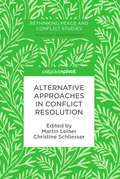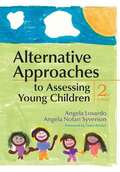- Table View
- List View
Almost Home: A Brazilian Americans Reflections on Faith, Culture, and Immigration
by H. B. CavalcantiIn Almost Home, H. B. Cavalcanti, a Brazilian-born scholar who has spent three decades working and living in the United States, reflects on his life as an immigrant and places his story within the context of the larger history of immigration. Due to both his family background and the prevalence of U.S. media in Latin America, Cavalcanti already felt immersed in U.S. culture before arriving in Kentucky in 1981 to complete graduate studies. At that time, opportunities for advancement in the United States exceeded those in Brazil, and in an era of military dictatorships throughout much of Latin America, Cavalcanti sought in the United States a nation of laws. In this memoir, he reflects on the dynamics of acculturation, immigrant parenting, interactions with native-born U.S. citizens, and the costs involved in rejecting his country of birth for an adopted nation. He also touches on many of the factors that contribute to migration in both the “sending” and “receiving” countries and explores the contemporary phenomenon of accelerated immigration. With its blend of personal anecdotes and scholarly information, Almost Home addresses both individual and policy-related issues to provide a moving portrait of the impact of migration on those who, like Cavalcanti, confront both the wonder and the disorientation inherent in the immigrant experience.
Alone Sometimes: Everybody Needs a Hole in the Ground
by Skylaar AmannIn Skylaar Amann’s gentle, beautifully illustrated picture book, two best friends learn that sometimes everyone needs a quiet, safe space to just be. Ren and Kit are the best of friends, always doing everything together. But when Ren needs some quiet time to herself, she chooses to hide away in an unlikely place. Kit doesn’t understand, but she’s willing to listen and learn. And in the end, they both realize that sometimes, everybody needs a hole in the ground. Alone Sometimes speaks directly to the need we all occasionally have for a safe space where we can hide away from the frustrations of the world.
Alone Time
by Sybil GeldartBeing alone gives you the chance to think about yourself and your needs and goals without undue pressure, distractions or interference.The importance of personal space in a changing world. In Alone Time, clinical psychologist and professor of psychology Sybil Geldart, PhD draws on personal anecdotes, case studies, and research to help you live well despite an ever-changing world. Taking time on your own allows you to take a slower, more deliberate pace and explore inner strengths, set goals and overcome problems. Practicing solitude is an age-old part of Eastern traditions of health and well-being, and ensuring some personal space and time alone – when self-initiated – will help you live a more fulfilled life. In Alone Time, Dr. Geldart shows how solitude allows us time for self-reflection, to gain self-knowledge, and to seek a better understanding of others. Perfect for all life stages, from school-leavers and young professionals on, Alone Time includes tips, advice and exercises to help boost mental health and attain that elusive work–life balance. Dr. Geldart also shows how voluntary distancing has numerous benefits in life – from work and study to overcoming stress and anxiety, and, most of all, in being emotionally healthy and inspired to work towards a healthy and happy future.
Alone Together: Why We Expect More from Technology and Less from Each Other
by Sherry TurkleConsider Facebook—it’s human contact, only easier to engage with and easier to avoid. Developing technology promises closeness. Sometimes it delivers, but much of our modern life leaves us less connected with people and more connected to simulations of them.In Alone Together, MIT technology and society professor Sherry Turkle explores the power of our new tools and toys to dramatically alter our social lives. It’s a nuanced exploration of what we are looking for—and sacrificing—in a world of electronic companions and social networking tools, and an argument that, despite the hand-waving of today’s self-described prophets of the future, it will be the next generation who will chart the path between isolation and connectivity.
Alone Together: Why We Expect More from Technology and Less from Each Other
by Sherry TurkleConsider Facebook--it's human contact, only easier to engage with and easier to avoid. Developing technology promises closeness. Sometimes it delivers, but much of our modern life leaves us less connected with people and more connected to simulations of them. In Alone Together, MIT technology and society professor Sherry Turkle explores the power of our new tools and toys to dramatically alter our social lives. It's a nuanced exploration of what we are looking for--and sacrificing--in a world of electronic companions and social networking tools, and an argument that, despite the hand-waving of today's self-described prophets of the future, it will be the next generation who will chart the path between isolation and connectivity.
Alone among the Living: A Memoir of the Floyd Hoard Murder
by G. Richard HoardThe son of a Georgia prosecutor killed by a car bomb offers a &“compelling&” account of the crime and its effect on his life (Booklist). When I was twenty I came face to face with the old man convicted of paying five thousand dollars for the murder of my father. From the gripping first line of this true story, you will follow a young man&’s journey through grief and despair to acceptance and forgiveness. On August 7, 1967, prosecutor Floyd &“Fuzzy&” Hoard was killed by a car bomb in his own front yard in Jackson County, Georgia. Summoning the memories of the events surrounding that day, Alone among the Living is G. Richard Hoard's remembrance of the father he lost on that day, and of his subsequent struggle to come to terms with the murder. &“A chronicle of grief and anger and confusion as Hoard tries to come of age without his father's help…A compelling story of loss, acceptance, and forgiveness.&”—Booklist &“He writes of the universal struggle to make sense of a world that often seems ruled by chaos and to find one&’s place in it.&”—Athens Banner-Herald
Alone in the Mirror: Twins in Therapy
by Barbara KleinAlone in the Mirror: Twins in Therapy chronicles the triumphs and struggles of twins as they separate from one another and find their individuality in a world of non twins. The text is grounded in issues of attachment and intimacy, and is highlighted by Dr. Barbara Klein’s scholarly research, clinical experiences with twins in therapy, and her own identity struggles as a twin, all of which allow her to present insights into the rare, complicated, and misunderstood twin identity. She presents psychologically-focused real life histories, which demonstrate how childhood experiences shape the twin attachment and individual development, and she describes implications for twins in therapy, their therapists, and parents of twins. Unique to this book are effective therapeutic practices, developed specifically for twins, and designed to raise the consciousness of parents as well. Readers will find these practices and the insights within invaluable, whether they use them to communicate with twin patients, family members, or if they are part of a twinship themselves.
Alone: A Widow's Search for Joy
by Katie F. WiebeKatie Wiebe's husband died of a rare disease, only two months after they moved to a new community, far from relatives. Katie was thirty-eight. She had to support her four children and her business skills were rusty. She was alone. This book is the story of how Katie Wiebe found strength to survive her loneliness and loss of identity, moving beyond widowhood into a new life, a new profession, and a new assurance that God wanted her to make a contribution to life.
Alone: On different ways of living
by Daniel Schreiber'A book to love and cherish'Deborah Levy, author of The Cost of Living'A beautiful writer and, just as important, a beautiful thinker'Hanya Yanagihara, author of A Little Life 'Friendship is, in fact, as much the topic of this book as aloneness'Sarah Bakewell, GuardianAt no time before have so many people lived alone, and never has loneliness been so widely or keenly felt. Why, in a society of individualists, is living alone perceived as a shameful failure? And can we ever be happy on our own?'A heartfelt memoir on being single, living alone and the existential experience of loneliness'Financial Times'Romantic love, suggests the author, is the lone "grand narrative" to have survived seismic societal shifts in modern times . . . Hermits and intimacy, the taboo of loneliness and the consolation of friendship - all find their place in a meditation that nods to joy and adversity'Observer
Alone: On different ways of living
by Daniel Schreiber'A book to love and cherish'Deborah Levy, author of The Cost of Living'A beautiful writer and, just as important, a beautiful thinker'Hanya Yanagihara, author of A Little Life 'Friendship is, in fact, as much the topic of this book as aloneness'Sarah Bakewell, GuardianAt no time before have so many people lived alone, and never has loneliness been so widely or keenly felt. Why, in a society of individualists, is living alone perceived as a shameful failure? And can we ever be happy on our own?'A heartfelt memoir on being single, living alone and the existential experience of loneliness'Financial Times'Romantic love, suggests the author, is the lone "grand narrative" to have survived seismic societal shifts in modern times . . . Hermits and intimacy, the taboo of loneliness and the consolation of friendship - all find their place in a meditation that nods to joy and adversity'Observer
Alpha God
by Hector A. GarciaThis book uses evolutionary psychology as a lens to explain religious violence and oppression. The author, a clinical psychologist, examines religious scriptures, rituals, and canon law, highlighting the many ways in which our evolutionary legacy has shaped the development of religion and continues to profoundly influence its expression. The book focuses on the image of God as the dominant male in Judaism, Christianity, and Islam. This traditional God concept is seen as a reflection of the "dominant ape" paradigm so evident in the hierarchical social structures of primates, with whom we have a strong genetic connection.The author describes the main features of male-dominated primate social hierarchies-- specifically, the role of the alpha male as the protector of the group; his sexual dominance and use of violence and oppression to attain food, females, and territory; in-group altruism vs. out-group hostility (us vs. them); and displays of dominance and submission to establish roles within the social hierarchy. The parallels between these features of primate society and human religious rituals and concepts make it clear that religion, especially its oppressive and violent tendencies, is rooted in the deep evolutionary past.This incisive analysis goes a long way toward explaining the historic and ongoing violence committed in the name of religion.From the Trade Paperback edition.
Alphabet
by Kathy Page"Simply an epiphany."-Kirkus, starred reviewSimon Austen has the names people have called him tattooed all over his body. Waste of Space. Bastard. A Threat to Women. Murderer. Facing a lifetime behind bars and subjected to new therapies for sexual reprogramming, Simon finds himself plunged into a terrifying process of self-reconstruction. But how much, in the end, can a man really change? Darkly compelling and deeply moving, Alphabet is a psychological exploration of one man's uncertain and often-harrowing journey towards rehabilitation."Intense, revealing, challenging and above all riveting ... I kept saying to myself, how could she know this?"-Erwin James, convicted murderer, author of A Life Inside: A Prisoner's Notebook"Sometimes novelists go too far-and sometimes they manage to demonstrate that too far is the place they needed to go."-Time Out UKPraise for Kathy Page"Her unforgettable prose is moody, shape-shifting, provocative and always as compelling as a strong light at the end of a road you hesitate to walk down...but will."- Amy Bloom, author of Where the God of Love Hangs Out"Marvellously well-crafted ... I can't remember the last time I was so compelled, impressed and unsettled by the emotional world of a novel."- Sarah Waters, author of Tipping the Velvet
Already Free: Buddhism Meets Psychotherapy On The Path Of Liberation
by Bruce Tift Tami SimonWhy are more and more psychotherapists embracing meditation practice, while so many Buddhists are exploring psychology? "Both psychology and Buddhism seek to provide freedom from suffering," explains Bruce Tift, "yet each offers a completely different approach for reaching this goal. " In Already Free, Tift opens a fresh and provocative dialogue between these two profound perspectives on the human condition. Tift reveals how psychotherapy's "Developmental" approach of understanding the way our childhood wounds shape our adult selves both contradicts and supports the "Fruitional" approach of Buddhism, which tells us that the freedom we seek is always available. In this investigation, he uncovers insights for connecting with authentic experience, releasing behaviors that no longer serve us, enhancing our relationships, and more. "When we use the Western and Eastern approaches together," writes Bruce Tift, "they can help us open to all of life--its richness, its disturbances, and its inherent completeness. "
Already Whole: Discovering the Sacred Within
by Helena HjalmarssonMany of us have made our lives so noisy, overwhelming, sensory craving and data driven that we have somehow missed the most fundamental part about ourselves and our lives. Learning how to work with every process, every situation, every relationship intuitively; learning to love what is, to let go, to have faith and find stillness; to foster one&’s intuition and become creative in our own lives is something we can all achieve. To illustrate these concepts, Hajlmarsson calls on her decades of experience and work as a psychotherapist. But most significantly, her life as an autism parent, accounted for in her previous books, Finding Lina 2013 and Beyond Autism 2019, which has taught her where to find that elusive freedom and harmony: inside herself. Hjalmarsson believes that the solution to life's chaos, this freedom and harmony—this love—is accessible to all. She writes, "We don&’t earn freedom. We either realize who we are and how we can live free, connected, joyful and expansive lives or we don&’t. We can realize it some of the time and live a little bit connected and a little bit trapped. Or we can learn to realize it most of the time and spend most of our lives fully awake."
Als Gleicher unter Verschiedenen?: Diskriminierung evolutionspsychologisch
by Lydia LangeWarum fallen Menschen in alte, zerstörerische Verhaltensmuster zurück? Wegen schlechten Charakters oder einer schlimmen Kindheit? Wenn wir die evolutionär geformte Natur des Menschen berücksichtigen, erkennen wir Möglichkeiten zur Kooperation und zu regelhaft gestalteter Konkurrenz.Soziale Diskriminierung als Begleiterscheinung der kulturellen Evolution kann kooperatives Verhalten untergraben. Konkurrenz als unverzichtbarer Bestandteil für den Prozess der Evolution muss dem gegenüber nicht notwendig in Feindschaft und Aggression münden, sondern kann menschengemachten Regeln folgen. Dieses Buch versucht zu zeigen, Ansatzpunkte in der frühen Phylogenese zu suchen und nicht zu große Hoffnungen auf unsere neuesten kultur-evolutionären Errungenschaften (gesinnungsethische Empfehlungen, Antidiskriminierungsgesetze, Änderung sprachlicher Symbole) zu setzen. Wenn die evolutionär geformte Natur des Menschen berücksichtigt wird, erkennen wir Möglichkeiten zur Kooperation und zu regelhaft gestalteter Konkurrenz. Dies wiederum kann helfen, dass evolutionspsychologische Erkenntnisse zur Vermeidung oder Verminderung sozialer Diskriminierung beitragen können.
Also Human: The Inner Lives of Doctors
by Caroline EltonA psychologist's stories of doctors who seek to help others but struggle to help themselves From ER and M*A*S*H to Grey's Anatomy and House, the medical drama endures for good reason: we're fascinated by the people we must trust when we are most vulnerable. In Also Human, vocational psychologist Caroline Elton introduces us to some of the distressed physicians who have come to her for help: doctors who face psychological challenges that threaten to destroy their careers and lives, including an obstetrician grappling with his own homosexuality, a high-achieving junior doctor who walks out of her first job within weeks of starting, and an oncology resident who faints when confronted with cancer patients. Entering a doctor's office can be terrifying, sometimes for the doctor most of all. By examining the inner lives of these professionals, Also Human offers readers insight into, and empathy for, the very real struggles of those who hold power over life and death.
Alt - Krank - Blank?: Worauf es im Alter wirklich ankommt
by Christian Hentschel Matthias BettermannDieses gut verständliche Werk bringt Licht ins Dunkel des komplizierten wirtschaftlichen Themas Rente und Vorsorge und erklärt die wichtigsten Dinge, von denen heutzutage auch ein nicht studierter Ökonom wissen sollte. Und es regt an zu einem neuen Mittel der Vorsorge gegen Armut im Alter: dem Erhalt von Familie, Partnerschaft und Freundschaft. Den einzigen Dingen im Leben, die man sich nicht kaufen kann. . . Freuen Sie sich auf eine Lektüre, die Ihnen in dieser Kombination eine besondere Hilfestellung zur Vorsorge im Alter bietet.
Altered States of Consciousness
by Charles T. TartCombining the best of the humanistic and scientific traditions, this book covers the effects of drugs, yoga, self-hypnosis, mutual hypnosis, meditation, brainwave feedback, and dream consciousness. As the author states in his introduction: "The 1980s have been thought of as a conservative time. With respect to consciousness exploration by individuals in point of fact such exploration is still very much with us. It will stay with us, for better or worse, because of dissatisfaction with the limitations of our culture."
Altered States of Consciousness: Experiences Out of Time and Self
by Marc WittmannWhat altered states of consciousness—the dissolution of feelings of time and self—can tell us about the mystery of consciousness. During extraordinary moments of consciousness—shock, meditative states and sudden mystical revelations, out-of-body experiences, or drug intoxication—our senses of time and self are altered; we may even feel time and self dissolving. These experiences have long been ignored by mainstream science, or considered crazy fantasies. Recent research, however, has located the neural underpinnings of these altered states of mind. In this book, neuropsychologist Marc Wittmann shows how experiences that disturb or widen our everyday understanding of the self can help solve the mystery of consciousness. Wittmann explains that the relationship between consciousness of time and consciousness of self is close; in extreme circumstances, the experiences of space and self intensify and weaken together. He considers the emergence of the self in waking life and dreams; how our sense of time is distorted by extreme situations ranging from terror to mystical enlightenment; the experience of the moment; and the loss of time and self in such disorders as depression, schizophrenia, and epilepsy. Dostoyevsky reported godly bliss during epileptic seizures; neurologists are now investigating the phenomenon of the epileptic aura. Wittmann describes new studies of psychedelics that show how the brain builds consciousness of self and time, and discusses pilot programs that use hallucinogens to treat severe depression, anxiety, and addiction.If we want to understand our consciousness, our subjectivity, Wittmann argues, we must not be afraid to break new ground. Studying altered states of consciousness leads us directly to the heart of the matter: time and self, the foundations of consciousness.
Altered States: Buddhism and Psychedelic Spirituality in America
by Douglas OstoIn the 1960s, Americans combined psychedelics with Buddhist meditation to achieve direct experience through altered states of consciousness. As some practitioners became more committed to Buddhism, they abandoned the use of psychedelics in favor of stricter mental discipline, but others carried on with the experiment, advancing a fascinating alchemy called psychedelic Buddhism. Many think exploration with psychedelics in Buddhism faded with the revolutionary spirit of the sixties, but the underground practice has evolved into a brand of religiosity as eclectic and challenging as the era that created it. <P><P>Altered States combines interviews with well-known figures in American Buddhism and psychedelic spirituality—including Lama Surya Das, Erik Davis, Geoffrey Shugen Arnold Sensei, Rick Strassman, and Charles Tart—and personal stories of everyday practitioners to define a distinctly American religious phenomenon. The nuanced perspective that emerges, grounded in a detailed history of psychedelic religious experience, adds critical depth to debates over the controlled use of psychedelics and drug-induced mysticism. The book also opens new paths of inquiry into such issues as re-enchantment, the limits of rationality, the biochemical and psychosocial basis of altered states of consciousness, and the nature of subjectivity.
Altered Traits: Science Reveals How Meditation Changes Your Mind, Brain And Body
by Daniel Goleman Richard DavidsonTwo New York Times–bestselling authors unveil new research showing what meditation can really do for the brain. In the last twenty years, meditation and mindfulness have gone from being kind of cool to becoming an omnipresent Band-Aid for fixing everything from your weight to your relationship to your achievement level. Unveiling here the kind of cutting-edge research that has made them giants in their fields, Daniel Goleman and Richard Davidson show us the truth about what meditation can really do for us, as well as exactly how to get the most out of it. Sweeping away common misconceptions and neuromythology to open readers’ eyes to the ways data has been distorted to sell mind-training methods, the authors demonstrate that beyond the pleasant states mental exercises can produce, the real payoffs are the lasting personality traits that can result. But short daily doses will not get us to the highest level of lasting positive change—even if we continue for years—without specific additions. More than sheer hours, we need smart practice, including crucial ingredients such as targeted feedback from a master teacher and a more spacious, less attached view of the self, all of which are missing in widespread versions of mind training. The authors also reveal the latest data from Davidson’s own lab that point to a new methodology for developing a broader array of mind-training methods with larger implications for how we can derive the greatest benefits from the practice. Exciting, compelling, and grounded in new research, this is one of those rare books that has the power to change us at the deepest level.
Alterity, Values, and Socialization: Human Development Within Educational Contexts (Cultural Psychology of Education #6)
by Angela Uchoa Branco Maria Cláudia Lopes-de-OliveiraThis book elaborates on issues regarding alterity, values, and human development in different educational contexts, serving from young children to adolescents to adults, and it claims for the need of educational contexts to consider their responsibilities regarding the development of the sociomoral dimension of human beings. The authors, experienced theorists and researchers sharing a cultural psychological perspective, provide a fresh understanding of educational institutions, and elaborate on how initiatives aiming at promoting dialogical practices and ethical orientation within educational contexts can be productive. They provide teachers, researchers, psychologists and parents, as well as the general public, with useful knowledge in order to contribute to theoretical and practical advances concerning education and human development.
Altern als Zukunft – eine Studie der VolkswagenStiftung
by Stephan Lessenich Frieder R. Lang Klaus RothermundDeutschland altert – aber was heißt das? Ist das schlimm? Und kann eine Gesellschaft überhaupt als Ganzes altern? In einer Zusammenführung von psychologischen, gerontologischen und soziologischen Erkenntnissen eröffnet dieses Open Access Buch einen bislang einzigartigen, vielseitigen und realistischen Blick auf das Phänomen des Alters und den Prozess des Alterns. Schwerpunkte des Projekts Altern als Zukunft waren Forschungen zu Altersbildern, zur Vorsorge für das Alter sowie zum Zeithandeln im Alter. Über ein Jahrzehnt lang führten die Autoren hierzu quantitative und qualitative Untersuchungen in drei Kontinenten durch. Die Ergebnisse zeigen, dass vereinseitigende Sichtweisen auf das Alter – seien es negative Stereotypen oder positive Überhöhungen – der Komplexität von Alternserfahrungen nicht gerecht werden. Das Buch richtet sich an alle, die sich für das Altern interessieren: wissenschaftlich, gesellschaftspolitisch, praktisch und persönlich. Ob alt oder jung, das Buch regt dazu an, eigene Sichtweisen zu hinterfragen. Eines wird deutlich: das ‚eine‘ Alter gibt es nicht – und Altern ist unsere Zukunft. Altern als Zukunft plädiert für die individuelle wie gesellschaftliche Akzeptanz der sozialen Tatsache des Alterns – und für das Recht, im höheren Alter genauso selbstbestimmt leben zu können wie in anderen Altersphasen auch.
Alternative Approaches in Conflict Resolution (Rethinking Peace and Conflict Studies)
by Martin Leiner Christine SchliesserThis edited volume brings together alternative and innovative approaches in conflict resolution. With traditional military intervention repeatedly leading to the transformation of entire regions into zones of instability and violence (Afghanistan, Iraq, Libya, Syria), the study of alternative and less violent approaches to conflict resolution has become imperative. Four approaches are presented here: negotiation, religion and gender, reconciliation and forgiveness, and the arts. This volume contains the insights and experiences of fourteen internationally renowned scholars and practitioners from different contexts. Can forgiveness help heal relationships in post-apartheid South Africa? How can art assist dealing with 'unrememberable' events such as the genocide in Rwanda? What transformational resources do women offer in contexts of massive human rights violations? The aim here is twofold: to provide and encourage critical reflection of the approaches presented here and to explore concrete improvements in conflict resolution strategies. In its interdisciplinary and international outlook, this work combines the tried-and-tested approaches from conflict resolution experts in academia, NGOs and civil society, making it an invaluable tool for academics and practitioners alike.
Alternative Approaches to Assessing Young Children
by Angela Losardo Angela Notari SyversonIn today's climate of increased accountability and diversity, alternative assessments for young children are more important than ever. That's why the timely NEW edition of this bestselling textbook is a must for all educators as they prepare to work with children who are culturally, linguistically, or developmentally diverse. <p><p>Developed by top authorities in early childhood special education and widely adopted since its first edition was published in 2001, this introductory text has been carefully updated to reflect 10 years of evolution in demographics, research, technology, and legislation.
